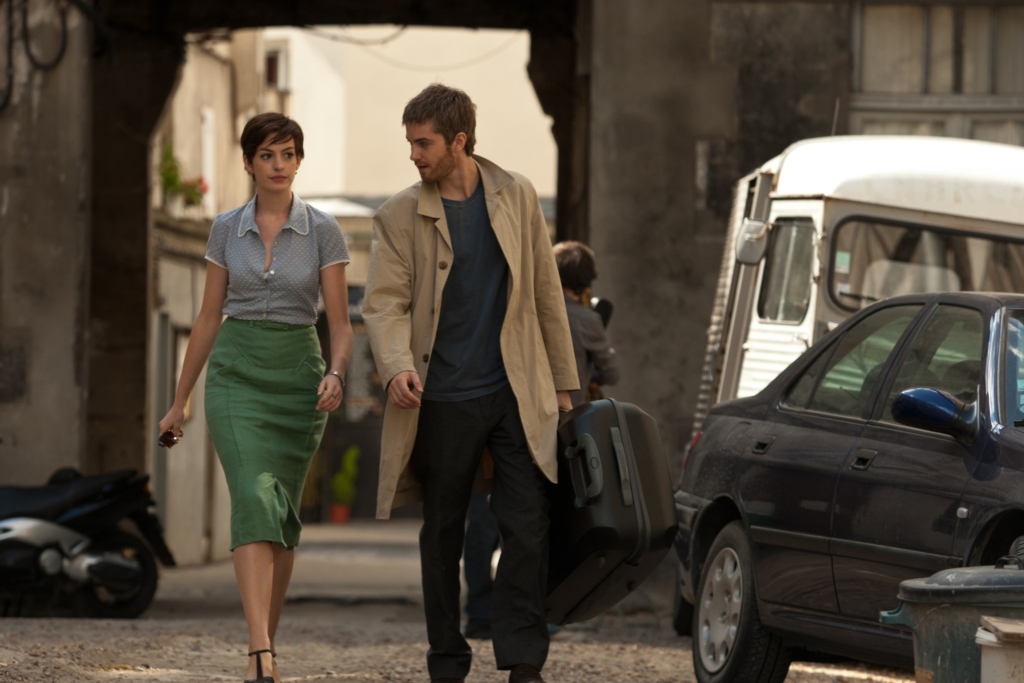To retell is to reminisce, to reimagine, and even readapt to a world that evolves with the gust of change. The stories that are ever-lasting have an undying habit of wanting to be heard. While One Day is no Pride and Prejudice, there exists a Shakespearean element that cinema has outpoured in reincarnating Emma and Dexter in an entwined story of friendship, love and the endurance of time.
David Nicholls’s 2009 novel, praised for its effortless humour and depth, charts the 20-year friendship of Emma and Dexter. On July 15, 1988, working-class Emma and privileged Dexter, an unlikely pair, share a tender moment in bed on their graduation night in Edinburgh. They discuss their future as adults, marking the start of their long, intertwined journey.
Nicholls renders his characters’ growth with such detail, that they seem less like fiction and more like real people to the readers. He knows them inside out and isn’t just observing them from the adjacent table in a coffee shop. Dexter and Emma fluidly navigate between fiction and reality, capturing the essence of relatable youth. Emma’s dreams of revolutionising her world are juxtaposed with Dexter’s carefree enjoyment of Parisian nights that bleed into vibrant dawns, creating a life that feels like an ongoing party.
Nicholls’s story spans over two decades of Em and Dex’s lives, making us grow with them as they navigate endless possibilities and the compromises of adulthood. Through acceptance and adjustments, they take different paths, yet their enduring connection shows that having someone to share life’s journey with is what truly matters.
One Day is a seminal work of art to come across in your 20s. You can visualise it and can’t stop but admire the ability to transgress your age as the narrative fluctuates. The story follows Emma and Dexter through annual snapshots, showing us one day of their lives each year for the next twenty years. Nicholls has crafted a charming, insightful, and poignant story that explores not just parallel coming-of-age journeys, but what happens when these moments come too late.
The 2011 movie, in its rush to be adapted for the big screen, omits crucial details and the annual snapshot structure. This makes much of the film feel like prolonged foreplay, leaving the audience waiting for a union that the movie continually hints at but never fully delivers. In trying to consistently make the film a rom-com, minus the comedy, it strips the story of what should have had the limelight: Emma and Dexter’s plausible coming of age journey as they tumble through life on a trial and error basis.
Nicholls’ book captures the joy and horrors of coming of age that is carried over from your late teens to early adulthood to your 30s and 40s. A book that serves as a poignant reminder of how quickly time passes, capturing the fleeting nature of life in just a single day. The structural premise is made more impactful and compelling in the 2024 Netflix series, which serialises the story in 30-minute episodes, casting Ambika Mod as Emma Morley and Leo Woodall as Dexter Mayhew.. The series showcases how narratives can grow and evolve, exploring new dimensions while staying true to the original work. At its core, we are invited to peek into the often lonely journey of coming into your own, navigating relationships and friendships, which often acts as an umbrella when it pours rains of loss. It is a wrenching warning that friendships, like fine antiques, must be taken care of; nothing remains as it is without care.
More importantly, it is about time. The creative reinterpretation of the Netflix series, allowing for a change in casting and minor thematic differences, makes all the difference in the world. Ambika Mod’s race as a brown girl is hard to gulp down initially. However it still manages to weave well with Emma’s tenacity, humouring despair and unsparing wit.. Over the next two decades, her connection with Leo proves to be a perfect match for the enduring friendship they cultivate. Dexter’s forgivable naivety, boyish charms, and desire to be unilaterally liked pair with Emma’s underrated talent, bold opinions, and unwavering need to be something. Letting them make innocent yet daring leaps toward an unlikely friendship that survives through years of storms.
Alongside technical differences, like Emma’s earlier demise in the Netflix series and Tilly’s amplified role in reuniting Emma and Dex, the show also extends the storyline. This contrasts with the 2011 movie, which failed to provide sufficient emotional depth to its characters. This expansive canvas allows more space for secondary characters, subplots, and thematic layers. The series feels less like a frozen picture snapshotted and more a continuous narrative unfolding organically, something the book graciously invites the reader to do.

Yet across the two adaptations of the book, one can not stop but admire Nicholls’s penchant for bringing two people from unlikely worlds, a posh southern boy and a working-class northern girl, above all, instilling hope in love and friendship. His narrative shows how these relationships can overcome class boundaries and endure the trials of time, ultimately gravitating towards each other despite their individual paths..
One Day stands tall as an embarking example of why retelling is a creative reimagining, and we need more artistic explorations of themes to reinterpret familiar material in innovative ways. Pushing the boundaries of visual storytelling serves as a catalyst for evolving readaptations. Narratives that reflect contemporary cultural shifts have the potential to engage new audiences and provide distinctive viewpoints on familiar themes.
Yet, a few things remain non transferable from the original. One of them is the letter Dexter writes to Emma on his trip to India. An excerpt from the letter, which Emma never receives, reads: “It’s stopped raining, and I’m about to go to a bar and meet up with some new friends for a drink, three female medical students from Amsterdam which tells you all you need to know. But on the way I’m going to find a post box and send this before I change my mind.
Not because I think you coming here is a bad idea – it isn’t, it’s a great idea and you must come – but because I think I might have said too much. Sorry if this has annoyed you. The main thing is that I think about you a lot, that’s all. Dex and Em, Em and Dex. Call me sentimental, but there’s no-one in the world that I’d like to see get dystenry more than you.
Taj Mahar, 1st August, 12 noon. I will find you! Love D”
This moment captures with ease the spirit of One Day, reminding us that while adaptations can breathe new life into a story, some original elements possess an irreplaceable charm.
Ananya is a freelance writer based out of New Delhi. She is an assistant professor of English who moonlights as a culture and media writer. Her previous works have been published in The Outlook Traveller, The Quint, and The Wire amongst others.




